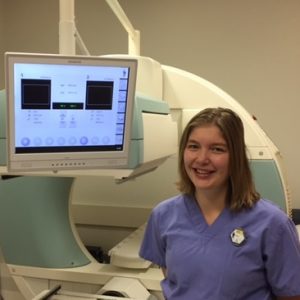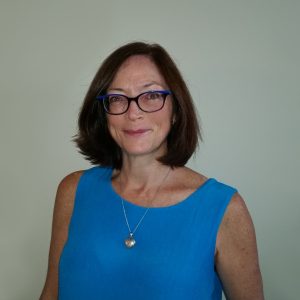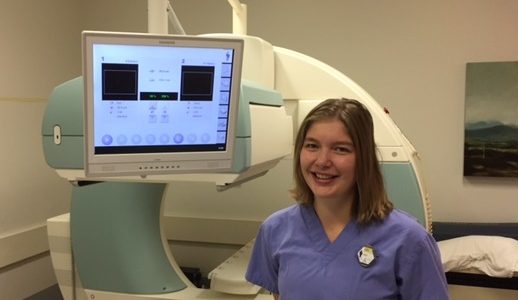“Lisa taught me how to be a caring nuclear medicine technologist”
There are approximately 115 nuclear medicine technologists working across the Lower Mainland integrated medical imaging sites! Nuclear Medicine Week (Oct 1-7, 2017) provides an opportunity for the nuclear medicine and molecular imaging community to take pride in their profession and recognize the important contributions to the advancements in healthcare.
Meet two nuclear medicine technologists
Both Lauren Faugner, a recent graduate and her mentor Lisa Hudkins, are nuclear medicine technologists who share a common passion about their profession.
The recent graduate

Lauren Faugner, Nuclear Medicine Technologist, St. Paul’s Hospital
Lauren Faugner, a recent graduate of the Nuclear Medicine Technology program at BCIT is passionate about choosing Nuclear Medicine as a career because it combines state-of-the-art technology for the benefit of the patient. “I love working with patients and am also able to keep current on laboratory techniques and research,” said Lauren.
Lauren is one of many students partnered with nuclear medicine departments in the Lower Mainland during their clinical training portions of the program. Lauren valued the time spent during her first summer at St. Paul’s Hospital under the mentorship of Lisa Hudkins and other nuclear medicine technologists.
Lauren said, “Lisa taught me how to be a caring technologist and work efficiently under stressful situations.” Lauren is now working at St. Paul’s Hospital as a Nuclear Medicine technologist.
The mentor

Lisa Hudkins, Nuclear Medicine Technologist, St. Paul’s Hospital
Lisa Hudkins, a technologist working for 30 years at St. Paul’s Hospital, still feels that nuclear medicine has a great balance of patient care and advancing technology. Lisa believes that every day is very interesting as each patient is unique.
“I pay special attention to each patients’ needs and then make sure those needs are met,” said Lisa.
Innovations and advancements in equipment, computer software and radiopharmaceutical development all provide a continuous learning opportunity for technologists. As a technologist and mentor, Lisa feels that “hitting that balance between competence and connection is where we can make a real difference in the patient’s experience.”
“Treating them with kindness, educating them about their exam, and what their experience will be, is a foundation to building that trust and helps to reduce their anxiety,” said Lisa. Lisa and other mentors make it a goal to impart those values to their students.
What is nuclear medicine?
Nuclear medicine is a medical imaging specialty that visualizes how the body is functioning at the molecular or cellular level. It is becoming more important to understand the body’s physiological processes in order to diagnose disease at an earlier stage and develop more effective medical treatments. Nuclear medicine continues to innovate in order to play an important role in the advancement of diagnostic and personalized therapeutic procedures.
Nuclear medicine uses radiopharmaceuticals (a pharmaceutical combined with a small amount of a radioactive material) which is injected, swallowed or inhaled and is then localized by the specific organ or physiological system being investigated. Images are acquired immediately or up to several days later using hybrid SPECT/CT cameras that combine 3-dimensional physiological data with anatomical data from a CT, increasing the diagnostic capabilities.
Myocardial Perfusion Imaging (MPI) and Bone scans are the most common diagnostic examinations performed. The most common therapeutic procedures are for the treatment of hyperthyroidism or thyroid cancer (using radioactive iodine). However, nuclear medicine–based therapies are expanding in the Lower Mainland to include radio-embolization of neuroendocrine tumors, palliative treatments for bone metastases from prostate cancer and radio-synovectomy in the treatment of rheumatoid arthritis.
A time to reflect and celebrate!
This year, please join in celebrating Nuclear Medicine Week and take a moment to recognize its important contribution to patient care.

